Dr. Esma Gel, the Cynthia Harton Milligan Chair of Business at the University of Nebraska Lincoln College of Business, views mathematics as a beautiful, universal language for expressing complex ideas. Gel’s story exemplifies how math can empower individuals, regardless of background, to lead and innovate in STEM. Math is fundamental to all humans; we’re born with an innate sense of numbers, counting, and numerosity.
Why Dr. Gel’s Story Matters
Although women make up over 50% of the U.S. population, they remain underrepresented in mathematics and statistics, according to the most recent data from the National Science Foundation (NSF). In 2018, women earned fewer than half of all degrees in mathematics and statistics, holding over 40% of bachelor’s and master’s degrees but under 30% of doctoral degrees. Over the past 20 years, their share of bachelor’s degrees declined, while master’s remained flat. Women’s doctoral representation rose from 25.7% in 1998 to 31.1% in 2008 but fell to 28% in 2018, despite an increase in the number of women earning these degrees.
Math as a Bridge Across Disciplines and Challenges
Dr. Gel firmly believes in the adaptability of mathematics, viewing it as a fundamental tool that transcends various disciplines. Mathematics is instrumental in solving real-world problems across fields such as business and disaster management. During the COVID-19 pandemic, Dr. Gel applied mathematical models to the study of epidemiology, despite lacking a formal background in that area. This example highlights the universality and versatility of mathematics. She considers math to be a universal language and humorously suggests that it could even be used to communicate with extraterrestrial beings, if they existed, due to its inherent precision and objectivity.
Overcoming Barriers in Math Through Familiarity
Dr. Gel recognizes the challenges many face in learning math, often due to unfamiliarity with arithmetic and notation. She likens the learning process to mastering musical notes—once understood, math becomes an elegant means of expressing complex ideas. For her, math is essential to civilization and fuels innovation. She supports efforts to make STEM education accessible to everyone, fostering an environment where women and underrepresented groups can thrive.
A Future Where AI and Math Unlock New Possibilities
Dr. Gel envisions a future where integrating AI in STEM fields makes complex mathematics more accessible. This integration will allow individuals to concentrate on framing problems and engaging in deeper analytical thinking. Such progress in computational thinking is expected to lead to a new era of innovation in STEM. Dr. Gel, a passionate advocate for this future, encourages everyone—especially women and underrepresented groups—to participate in this transformation. She believes that by advancing together, we can unlock unprecedented opportunities in STEM, creating space for the unique perspectives and talents of those ready to shape the future.
Dr. Esma S. Gel is Cynthia Hardin Milligan Chair of Business and Professor at the Department of Supply Chain Management and Analytics of the University of Nebraska-Lincoln. Prof. Gel’s research focuses on the use of stochastic modeling and control techniques for the design, control and management of operations in various settings, with emphasis on manufacturing and service systems, business and logistics processes, health care systems and pandemic operations and resource management. She holds a B.S. degree in Industrial Engineering from Middle East Technical University, Turkey, and M.S. and Ph.D. degrees in Industrial Engineering from Northwestern University
Sign up for updates
Explore Themes and Ideas































































